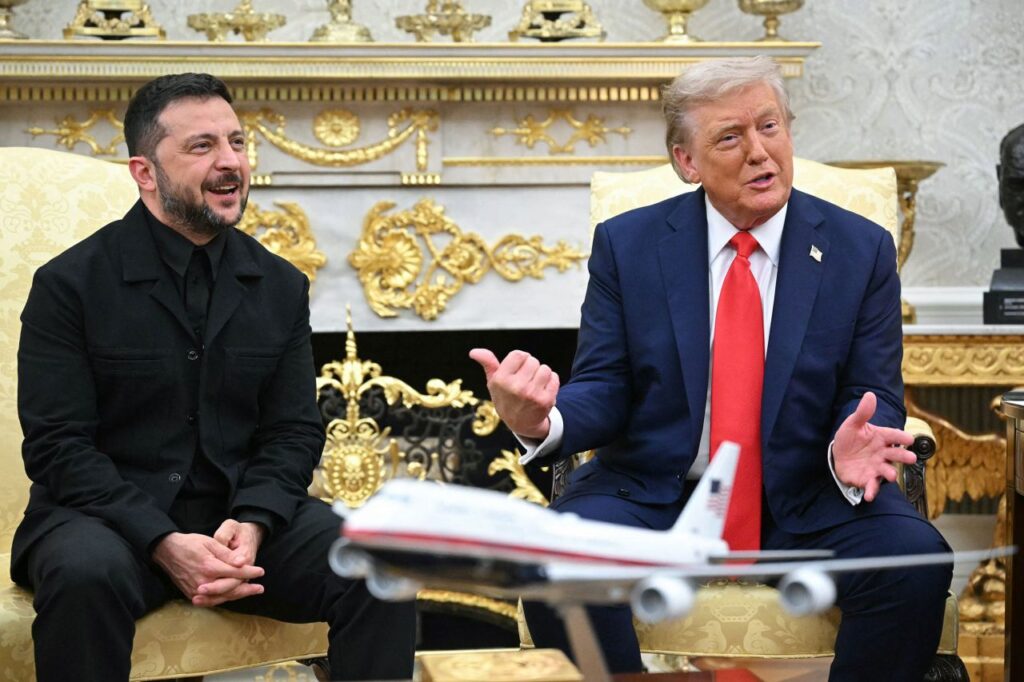Zelenskyy demands “everything” for security while Trump hints at vague Article 5-like protection

Ukrainian President Volodymyr Zelenskyy met US President Donald Trump in Washington on 18 August, backed by a delegation of European leaders urging Trump to support Ukraine with ironclad postwar security guarantees. Their talks focused on ending the war with Russia, but without letting Moscow dictate terms. While Trump said the US would provide “very good protection” to Ukraine, he avoided detailing what that meant. Crucially, he refused to rule out sending US troops—leaving open the possibility of deeper military involvement as part of the proposed Article 5-like protection framework.
European leaders bring red lines to Trump’s push for quick deal
The New York Times reports that European leaders accompanied Zelenskyy to the White House to present coordinated red lines:
- a cease-fire must come before any territorial discussions;
- unoccupied territory must not be handed over to Russia;
- there must be no legal annexation of any Ukrainian land; and Ukraine must receive security guarantees capable of deterring any future Russian invasion, regardless of what Moscow promises.
According to NYT, President Trump did not explicitly reject these demands but emphasized he is focused on a “permanent solution” rather than a fragile agreement that could collapse into renewed war “two years from now.”
He declined to say whether he would support sending US peacekeepers to Ukraine. Instead, he said, “There’s going to be a lot of help,” and added that he would discuss the issue further with European leaders after his meetings.
CNN noted that Steve Witkoff, Trump’s special envoy, previously described the proposed security terms as “Article 5-like protections,” referencing the NATO clause on collective defense. That framing implies US involvement in Ukrainian security without granting NATO membership.
Zelenskyy says Ukraine needs “everything” to prevent Russia from striking again
When asked what kind of security guarantees Ukraine needed, Zelenskyy replied:
“Everything.”
Speaking in the Oval Office alongside Trump, he explained that this includes two essential components: military power—meaning weapons, people, training missions, and intelligence—and support from major countries like the United States, CNN says.
He stressed that any settlement without these elements would allow Russia to regroup and eventually attack again. CNN quotes Zelenskyy as saying the guarantees “depend on the big countries, on the United States, on a lot of our friends.”
Trump did not challenge that assessment, but offered no details about what kind of American commitment he would consider.
Trump eyes post-meeting call with Putin as trilateral scenario emerges
President Trump said he would be calling Russian President Vladimir Putin directly after concluding his meetings with Zelenskyy and European leaders.
“I just spoke to President Putin indirectly, and we’re going to have a phone call right after these meetings today,” Trump said from the Oval Office, CNBC reports.
He added that such a call could lead to a trilateral conversation involving Ukraine, Russia, and the US.
“There’s a good chance of maybe ending” the war, Trump said. But he also left open the alternative: “If not, then the fighting continues.”
Trump’s peace plan meets domestic pressure over foreign wars
Although Trump has kept his base wary of foreign entanglements, The New York Times notes that he did not rule out US troop deployment, a position likely to trigger backlash. During his campaign, he had promised to reduce American involvement in foreign conflicts. Nonetheless, his current posture leaves room for some level of military commitment.
CNN reports that Trump stated on 18 August that offering Ukraine security guarantees is still under discussion among the US and European leaders. He said:
“We’re going to be discussing it today, but we will give them very good protection, very good security.”